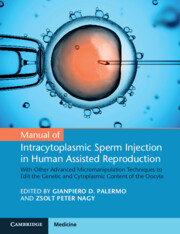 Manual of Intracytoplasmic Sperm Injection in Human Assisted Reproduction
Manual of Intracytoplasmic Sperm Injection in Human Assisted Reproduction Published online by Cambridge University Press: 02 December 2021
Mitochondrial (mt)DNA mutations can cause a broad range of severely debilitating or fatal disorders. There is no cure available and the only available treatments have purely symptomatic effects. Preventing mitochondrial disease transmission is therefore a major priority. Germline nuclear transfer (NT), such as maternal spindle (ST), pronuclear (PNT) or polar body (PBT) transfer, has been proposed as a possible strategy to prevent mother-to-child transmission of mtDNA mutations. This technology involves nuclear genome transfer from an oocyte or zygote carrying mtDNA mutations to an enucleated donor counterpart with healthy mtDNA. In addition, the technology has also been considered as a treatment option for certain infertility indications, such as women experiencing poor embryo development, with the expectation of improving in vitro treatment outcomes. Here, we provide an overview on recent developments in the field of NT, either with the aim to avoid mtDNA diseases or to overcome certain forms of female infertility.
To save this book to your Kindle, first ensure no-reply@cambridge.org is added to your Approved Personal Document E-mail List under your Personal Document Settings on the Manage Your Content and Devices page of your Amazon account. Then enter the ‘name’ part of your Kindle email address below. Find out more about saving to your Kindle.
Note you can select to save to either the @free.kindle.com or @kindle.com variations. ‘@free.kindle.com’ emails are free but can only be saved to your device when it is connected to wi-fi. ‘@kindle.com’ emails can be delivered even when you are not connected to wi-fi, but note that service fees apply.
Find out more about the Kindle Personal Document Service.
To save content items to your account, please confirm that you agree to abide by our usage policies. If this is the first time you use this feature, you will be asked to authorise Cambridge Core to connect with your account. Find out more about saving content to Dropbox.
To save content items to your account, please confirm that you agree to abide by our usage policies. If this is the first time you use this feature, you will be asked to authorise Cambridge Core to connect with your account. Find out more about saving content to Google Drive.